Photographs: B Mathur/Reuters
Dr Hu Shisheng, deputy director of the Institute of South and South Asian Studies in the China Institutes of Contemporary International Relations, is a renowned Chinese expert, who is often quoted by the Indian media and strategic analysts on Sino-Indian relations.
Hu was recently in India to participate in the CICIR-IDSA dialogue. In a free and frank discussion with Rup Narayan Das, senior fellow at Institute for Defence Studies and Analyses, shares some of his ideas and thoughts on Sino-Indian relations.
You have been observing Sino-Indian relations for all these years. In your view, what are the prospects of Sino-Indian relations?
Due to the fact that Sino-Indian relations are extremely important for both countries not only to seek their strategic rising into global powers but also to maintain their sustainable people-centric development, Sino-Indian relations will, in a long run, be stable.
It doesn't means that there will be no hiccups, but generally speaking, cooperation will prevail against conflicts, even competition will be mainly carried out in line with international rules.
...
'China, India don't have guts to resolve issues'
Image: China's Premier Wen Jiabao talks to Prime Minister Manmohan Singh before a gala dinner in HanoiPhotographs: Hoang Dinh Nam/Pool/Reuters
We are much mutually needed in our various developments, thanks to the similar challenges and threats we are facing in the coming years both domestically and externally. So, it is a must, no alternative, for China and India, bordering with each other, to explore and expand our cooperation during our process.
What, in your opinion, are the major impediments to Sino-Indian relations?
One major impediment could be the old mentality, such as play zero-sum games, insist on the concepts of influential spheres, power of balance, natural barriers, and etc, practice the beggar-my-neighbour policy.
This thinking and practices have made both China and India not so easy to get adapted with each other's rapid rising influence and presence in their 'traditional influential spheres'.
The other major impediment could be neither government has the guts in making any breakthrough in politically highly-sensitive issues like territory disputes in particular, during the current social and economic and even political transformation period in both countries.
This kind of breakthrough needs strong public support, while currently both peoples, armed with strong nationalism, not only have many misunderstandings toward the bilateral differences and disputes, but also have many resentments against the incumbent politics.
In this regard, whether the multi-parties in India or the Communist Party in China have to demonstrate their resolute in safeguarding the so called "core national interests", to gain or enhance their legitimacy in ruling their respective countries.
'China doesn't want to get involved in Kashmir'
Image: Pakistan's Prime Minister Yousuf Raza Gilani and Chinese Premier Wen JiabaoPhotographs: Mian Khursheed/Reuters
You have said that stapled visas are not a major issue in Sino-Indian relations. Why do you think so?
Because this issue had been mainly created by lack of efficient and timely communications and explanations.
China strongly advocates India and Pakistan to settle Kashmir issue by themselves. China doesn't want to get involved. The latest developments on this issue have supported by arguments.
Related to this, is the question, has China changed its policy towards Kashmir?
Since the 1999 Kagil conflict, China has always practiced a neutral policy on the Kashmir issue. This position has never changed.
What is China's position on India's bid for membership for United Nations Security Council? Has it changed in recent past in India's favour?
China would like to see India play a much bigger role in the UN. Anyway, this development will enhance the representatives of the developing world.
'China won't block India's UNSC ambition'
Image: UN Security CouncilBeing developing countries, China and India share many common points and challenges in dealing with the existent international systems. With India's deep involvement in the international mechanisms like the UN, China would also feel strengthened in creating a more just and fare, and ground-realities reflective international political and economic order.
The reform of the existent international systems, especially UN structures, is extremely complicated, because such reform not only aims to increase the representatives of emerging powers, but also aims to reduce the rights and privileges, which would be extremely difficult.
It is not China's tradition or practice to make empty promise or draw cakes to stave off hunger. I noticed that the other P5 members had either promised to support India's permanent membership in the Security Council in a "reformed UNSC", or purposely kept silence on whether India would get "veto"power in a "reformed UNSC".
Anyway, China would definitely be not the obstacle in India's efforts to seek permanent membership in UNSC.
'India's US policy is more independent'
To what extent is the Indo-US strategic relationship a factor in Sino-Indian relations?
If Indo-US strategic relationship, whether based upon "political values", on built upon security reasons, is aimed at containing China, it will be problematic for Sino-Indian relations.
Generally speaking, Chinese scholars tend to believe that India values its strategic relations mainly for its strategic rising; India's US policy is more principle-guided and more independent. India could never become a second Japan in this regard.
What are the major hurdles for the settlement of the border-dispute between the two countries?
The positions of both governments on this dispute are extremely opposite, and being very difficult for both governments to narrow down their differences, while facing a stronger and stronger public pressure on this dispute.
Hence, lack of strong public support to encourage the current governments to settle the issue in a meaningful and mutually acceptable settlement becomes the major hurdle.
'Many areas where India, China can cooperate'
Image: China's Defence Minister Liang Guanglie (R) stands next to India's Defence Minister A K AntonyPhotographs: Kham/Reuters
Do you think the Sino-Indian relationship is adversarial, or you believe there is enough scope for both to cooperate and collaborate?
I believe there is enough scope for both countries to cooperate and collaborate. Suppose, if we couldn't deepen our cooperation in trans-border rivers, we can cooperate in developing water-efficient technology for farming, management and supplement of tapping water, jointly develop water resources in Nepal, Afghanistan, Bhutan and other non-politically sensitive regions.
For example, if we cannot cooperate in fighting against terrorism due to various reasons, then we can at least cooperate in sharpening our anti-terror tactics, dismantling the terrorist financial networks, fighting against cyber terrorism.
There will be always new areas for us to cooperate and collaborate, since we are facing similar challengers.
'From India, I see China'
Image: People walk inside the newly constructed Terminal 3 at Indira Gandhi International Airport in New DelhiPhotographs: B Mathur/Reuters
How do you think the think-tanks of the two countries can promote better understanding and cooperation between the countries and their people as a part of track-two diplomacy?
By encouraging scholars to write articles repeatedly on disputed issues and reeducating the people about the realities; by submitting policy report to respective governments; by co-sponsoring some joint projects addressing the ticklish issues between us; by organising workshops in a series to discuss publicly and fully all our concerns; by publishing books covering various perspectives form both sides on bilateral issues; by interacting with officials and officers in each other countries.
You recently visited India. How do you perceive the developments in India?
This trip was very impressive. Both the Indira Gandhi International Airport and Bengalaru's new airport are very modern and comfortable; I found New Delhi Metro constructions have made a very big progress.
Form the sky, I got a bird view and found that many many residential towers being built.
Both the cities are hectic with various projects under construction. Such dynamics really have impressed me a lot. Only during this time's trip, I for the first time felt the dynamics of India. From India, I see China.
'China and India should take more responsibilities'
Image: A man walks past a signage decoration for the BRICS summit outside Sheraton Hotel, the venue for the third BRICS summit in Sanya, Hainan provincePhotographs: Jason Lee/Reuters
How can the two countries cooperate in multi-lateral forums such as the BRICS?
Be more focussed on social and economic developments; be more sensitive and responsive toward latest trends and eventualities in the international political and economic communities; be more focussed on action; maintain timely communications on all issues concerning us and the world; use new multi-lateral forums, especially BRICS to coordinate better policies, better speak in one voice on major developmental issues.
And China and India should take more responsibilities in this regard. We must not let bilateral disputes to disturb our cooperation and coordination in multi-lateral forums as BRICS; take full usage of the respective strengths of the members.

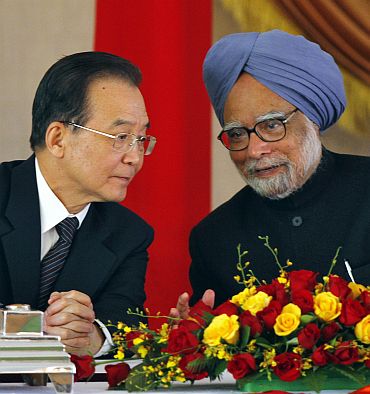
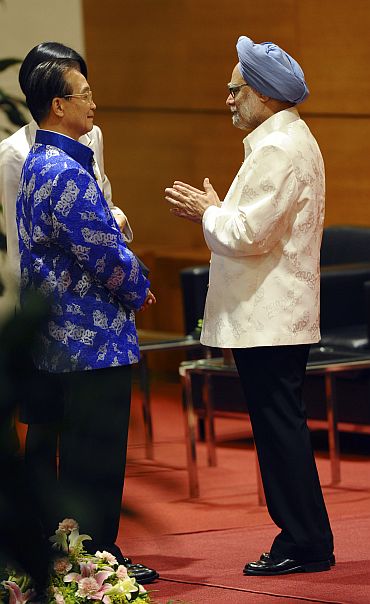

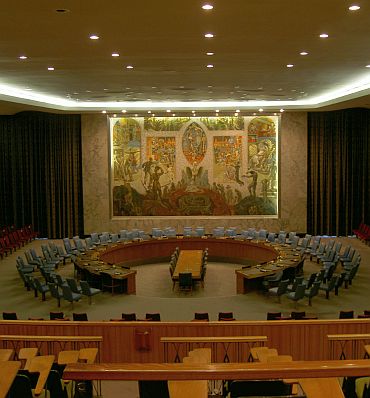
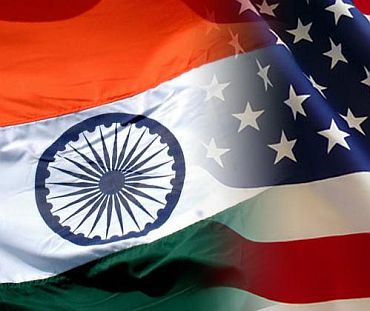
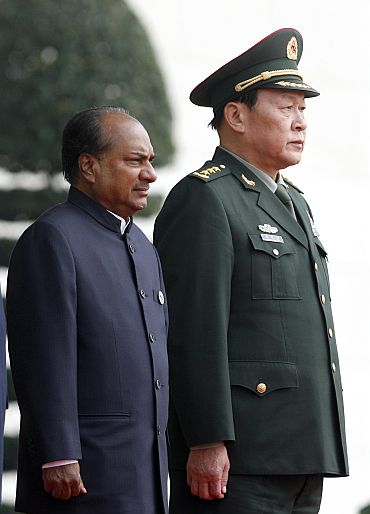
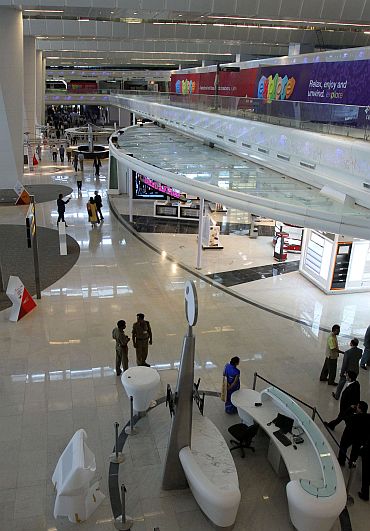

article